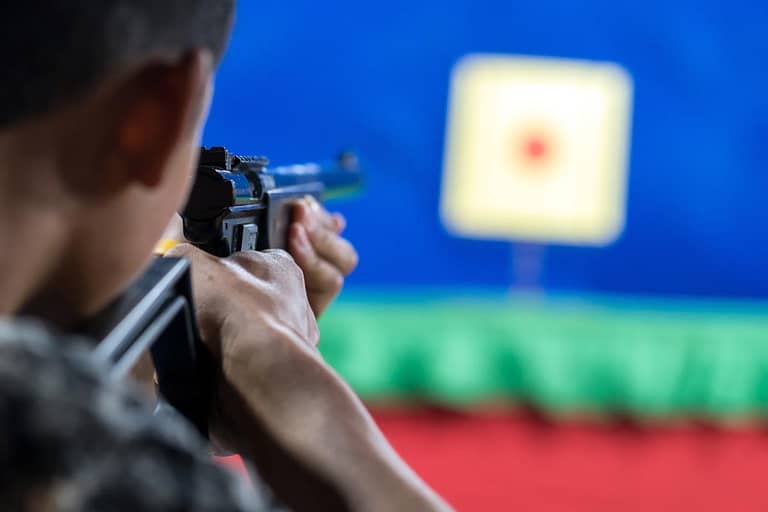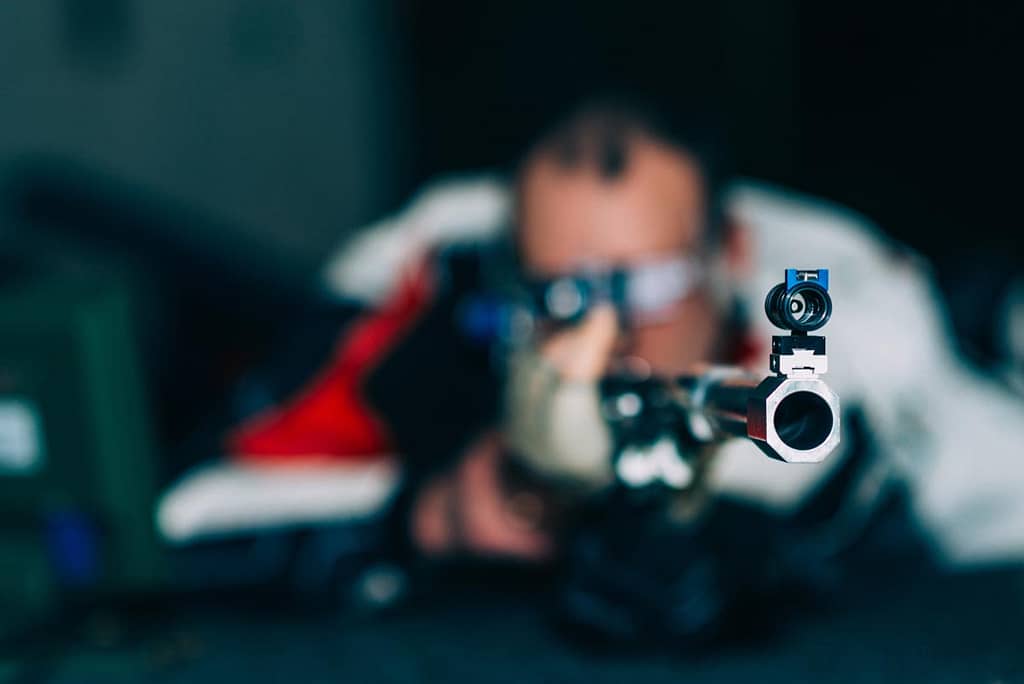Olympic Shooting: A Sport of Precision and Focus
Olympic shooting is a sport which demands extreme precision, focus, and mental toughness from its athletes. It’s a discipline that has evolved over time. Its ancient roots led to the modern Olympic Games. It captivates global audiences with its skill and accuracy.

The Evolution of Olympic Shooting: From Ancient Times to the Modern Games
Shooting has been a part of the Olympic Games since the very beginning. In fact, it was one of the nine sports featured in the first modern Olympics in Athens, Greece, back in 1896. But the history of shooting as a sport goes back even further than that.
In ancient times, archery was a popular form of shooting used for hunting and warfare. It wasn’t until the invention of firearms that shooting began to evolve into the sport we know today.
Over the years, Olympic shooting has undergone many changes and adaptations. New events have been added, rules have been modified, and technology has advanced. But one thing has remained constant: the need for precision and focus.
Olympic Shooting Disciplines: Exploring the Various Events
Olympic shooting has many disciplines. Each has its own unique challenges and requirements. Here are some of the main events:
- Rifle: Athletes shoot at targets from 10, 25, or 50 meters. They use either air rifles or small-bore rifles.
- Pistol: Competitors fire at targets from a distance of 10, 25, or 50 meters using air pistols or sport pistols.
- Shotgun: Athletes shoot at clay targets. The targets are launched into the air from various angles and distances.
- Running Target: Shooters aim at a moving target. It travels across a 10-meter range at varying speeds.
Each discipline has different events. They are based on factors such as distance, type of firearm, and number of shots. Some events are also divided by gender or age group.
Shooting Range Essentials: Understanding the Equipment and Facilities
To excel in Olympic shooting, athletes need access to top-notch equipment and facilities. A typical shooting range includes:
- Firearms used in Olympic shooting events include rifles, pistols, shotguns, and air guns.
- Targets vary by event. They range from simple bullseyes to complex silhouettes or moving targets.
- Shooting Stations: Athletes shoot from designated positions. These may be prone, kneeling, or standing.
- Safety Equipment: Shooters need ear and eye protection. These prevent injury from loud noises and flying debris.
In addition to these basic parts. many shooting ranges also have electronic scoring systems. They also have wind gauges and other high-tech tools. These tools help athletes train and compete at the highest level.
Mastering the Art of Marksmanship: Techniques and Training for Olympic Shooting
Becoming an Olympic-level shooter requires years of dedicated training and practice. Athletes must master a range of techniques, including:
- Aligning the sights on the firearm with the target is crucial. This is called “sight alignment”.
- Trigger Control: Shooters must learn to squeeze the trigger smoothly. This must be done without disturbing their aim.
- Breath Control: Controlling breathing helps maintain stability and reduce movement while shooting.
- Follow through. Keep focusing on the target and keeping form after the shot.
In addition to these skills, Olympic shooters also need mental toughness. They must perform under pressure. Many athletes work with sports psychologists. They also use visualization techniques. These help them stay focused and calm during competition.

Mental Toughness in Olympic Shooting: The Power of Concentration and Control
One of the most important aspects of Olympic shooting is mental toughness. Shooting requires deep focus. You must block out internal and external distractions.
Athletes must learn to control their emotions, thoughts, and physical responses. They do this to keep a steady hand and a clear mind. They must be able to focus on the present moment and let go of any mistakes or missed shots.
Developing mental toughness takes time and practice. Many shooters use techniques like meditation and deep breathing. They also use positive self-talk. These help them stay calm and focused under pressure.
The Role of Technology in Olympic Shooting: Innovations and Advancements
Like many sports, Olympic shooting has felt the impact of technology. Some of the most significant innovations include:
Many ranges now use electronic targets. They automatically register and score each shot. They replace manual scoring and cut the risk of human error.
High-Tech Firearms: Modern Olympic firearms are precision-engineered tools. They use advanced materials, ergonomic designs, and customizable features to boost performance.
Some athletes use wearable devices. They track their physical responses and optimize their training. These devices include heart rate monitors and motion sensors.
Technology can help shooters. But, Olympic shooting success comes down to skill, dedication, and mental toughness.

Olympic Shooting Legends: Celebrating the Icons of the Sport
Throughout Olympic shooting’s history, many legendary athletes have left their mark on the sport. Here are just a few:
- Kim Rhode (USA) has won six Olympic medals. She has competed in six consecutive Olympic Games. She is the first Summer Olympian to win medals in six straight Olympics.
- Jin Jong-oh (South Korea) has won a total of seven Olympic medals. These include four golds. They make him one of the most successful shooters in Olympic history.
- Nino Salukvadze (Georgia): She has competed in nine Olympic Games. She won one gold, one silver, and one bronze medal. She is also the first mother-daughter duo to compete in the same Olympic Games.
These athletes and many others have inspired generations of shooters with their skill, dedication, and sportsmanship.
Shooting for Gold: The Journey of Olympic Shooting Athletes
The journey to becoming an Olympic shooter is a long and challenging one. Athletes must train and compete for years. They often make big sacrifices.
Many shooters begin training at a young age, sometimes as early as elementary school. They may start by learning firearm safety and marksmanship basics. Then, they move to more advanced techniques and disciplines.
As they improve, shooters may compete at local, regional, and national levels. They may also seek specialized coaching. Or, they can join elite training programs to help them reach the next level.
Ultimately, many shooters aim to earn a spot on their country’s Olympic team. They want to compete on the world stage. But, even for those who don’t make it to the Olympics. The journey itself can be rewarding and transformative.
Olympic Shooting: A Global Phenomenon and its Cultural Impact
Olympic shooting is truly global. Athletes from countries all over the world compete in the sport. In fact, shooting has been included in every modern Olympic Games except for 1904 and 1928.
Shooting’s popularity varies by country. It has a strong following in nations such as China, Russia, and the United States. In these countries and others, shooting is not just a sport. It is a cultural tradition with deep roots and meaning.
Shooting can also unite people. It can promote global cooperation and understanding. The Olympic Games provide a stage. Athletes come from diverse cultures to be on it. They compete on a level field and promote values like fair play, respect, and excellence.
The Olympic Shooting Experience: Behind the Scenes at the Games
For the athletes who make it to the Olympic Games, the experience is unlike anything else. The pressure is intense, the competition is fierce, and the stakes are high.
Behind the scenes, there is a flurry of activity to ensure that everything runs smoothly. Organizers work tirelessly to set up and keep the shooting ranges. They also manage logistics and support the athletes and coaches.
The shooters feel a whirlwind of emotions. They also face many challenges at the Olympics. They face the pressures of competition and media. They also face the expectations of their fans and supporters back home.
But for those who are able to rise to the occasion and perform at their best, the rewards can be great. Winning an Olympic medal is the highest achievement in shooting. It is a testament to years of hard work.

